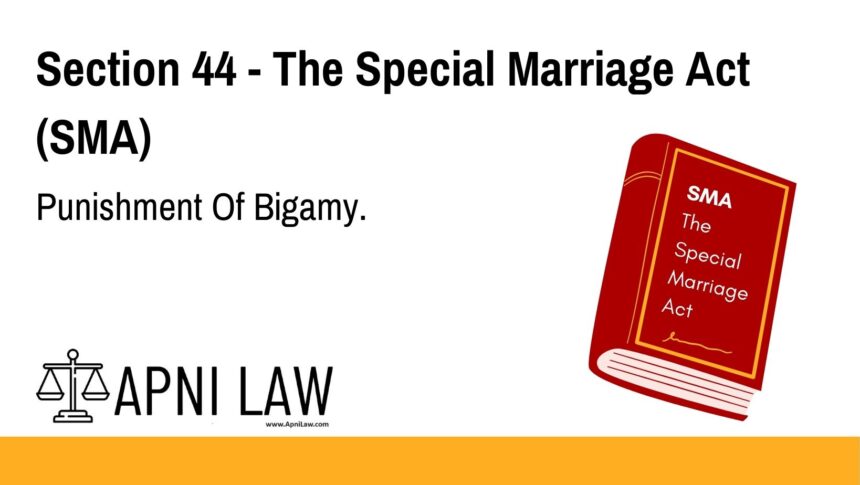Code: Section 44, Special Marriage Act, 1954
“Every person whose marriage is solemnized under this Act and who, during the lifetime of his or her wife or husband, contracts any other marriage shall be subject to the penalties provided in section 494 and section 495 of the Indian Penal Code (45 of 1860), for the offence of marrying again during the lifetime of a husband or wife, and the marriage so contracted shall be void.”
Explanation of Section 44 – Special Marriage Act
Section 44 of the Special Marriage Act, 1954 enforces the principle of monogamy by criminalizing bigamy for persons married under this Act. It specifically states that if a person whose marriage is already solemnized under the Special Marriage Act enters into another marriage during the lifetime of their spouse, the second marriage is void and the person is liable to punishment under Sections 494 and 495 of the Indian Penal Code, 1860.
This provision ensures legal consistency by penalizing second marriages during the subsistence of the first, and reinforces that monogamy is a legal obligation under this civil law framework.
Key Provisions
- Applies to individuals already married under the Special Marriage Act.
- Contracting another marriage during the lifetime of the first spouse is a punishable offence.
- The second marriage is legally void.
- Offenders are punishable under:
- Section 494 IPC – Marrying again during the lifetime of a spouse
Read Section 494 IPC - Section 495 IPC – Bigamy with concealment of the first marriage
Read Section 495 IPC
- Section 494 IPC – Marrying again during the lifetime of a spouse
Illustration
Example 1: Marriage Under SMA Followed by Bigamy
Suresh marries Rina under the Special Marriage Act. While still married to Rina and without securing a divorce, he marries another woman. Since the second marriage is during the lifetime of his first wife and without dissolution, it is void and Suresh is punishable under Section 494 or 495 IPC depending on whether he disclosed his marital status.
Example 2: Concealment of First Marriage
Anita, after marrying Raj under SMA, later marries another man without informing him of her existing marriage. This act amounts to bigamy with concealment and is punishable under Section 495 IPC.
Common Questions & Answers on Section 44 SMA
1. Who does Section 44 apply to?
It applies to individuals whose marriage has been solemnized under the Special Marriage Act, 1954.
2. What if someone marries again under religious law after marrying under SMA?
Regardless of the form or law under which the second marriage is performed, if the first marriage is still valid and undissolved, the second marriage is void and punishable.
3. Is the second marriage legally recognized?
No. The second marriage is void under Section 44 and has no legal standing.
4. What’s the difference between Section 43 and Section 44 of the SMA?
Section 43 punishes a person who is already married and attempts to remarry under the SMA, while Section 44 punishes those who, after marrying under the SMA, contract another marriage during the first marriage’s subsistence.
Conclusion
Section 44 of the Special Marriage Act, 1954 safeguards the legality and sanctity of marriage by clearly stating that bigamy is a punishable offence. It ensures that once married under the Act, individuals cannot marry again during the lifetime of their spouse without facing legal consequences, including imprisonment under the Indian Penal Code. The provision reinforces the civil law commitment to monogamy and prevents exploitation through multiple marriages.
For more insights and legal updates, visit ApniLaw.








